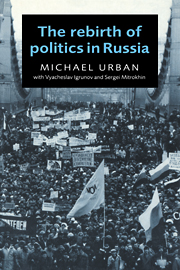Book contents
- Frontmatter
- Contents
- Preface
- Part I The pre-political context
- Part II Perestroika and the return of political life
- Part III Politics and revolution
- Part IV Ground up: politics in post-communist Russia
- 11 Reform, reaction and rebellion: the calamity of the first republic
- 12 Neither democracy nor dictatorship
- Notes
- Index
12 - Neither democracy nor dictatorship
Published online by Cambridge University Press: 22 October 2009
- Frontmatter
- Contents
- Preface
- Part I The pre-political context
- Part II Perestroika and the return of political life
- Part III Politics and revolution
- Part IV Ground up: politics in post-communist Russia
- 11 Reform, reaction and rebellion: the calamity of the first republic
- 12 Neither democracy nor dictatorship
- Notes
- Index
Summary
The face of contemporary political life in Russia combines both democratic and dictatorial features. Their co-presence has been inscribed by the victors of October 1993 into the country's constitution which retains institutions and practices associated with modern democracy – freedom of expression and association, public elections and popular assemblies – but drastically restricts their influence on the executive agencies of the state. The legislative power of the popularly elected lower house of the Federal Assembly (the State Duma) is hemmed in by the upper chamber (the Council of the Federation) the vast majority of whose members owe their seats directly or indirectly to the president, the president's own law-making and veto prerogatives, and a nominally independent Constitutional Court, whose loyalties have leaned toward the justices' patron – the president – as evinced, for instance, in the way in which they have freighted the legislative process with a definition of the majority required to pass a bill: half-plus-one of all seats in the Duma, no matter how many are vacant at a given time owing to truancies, assassinations or failure to hold elections in certain districts. Consequently, the executive's power dwarfs that of the legislature. This distribution of authority in the constitutional order calls to mind the pattern of ‘delegative democracy’ as described by Guillermo O'Donnell, a sort of elected dictatorship unencumbered by a legislative counterweight that enables the president to enact his putative popular mandate to perform surgery on an ailing body politic (‘reform’). However, that concept would have limited purchase in contemporary Russia where two of its key components go partly or entirely missing.
- Type
- Chapter
- Information
- The Rebirth of Politics in Russia , pp. 291 - 310Publisher: Cambridge University PressPrint publication year: 1997



